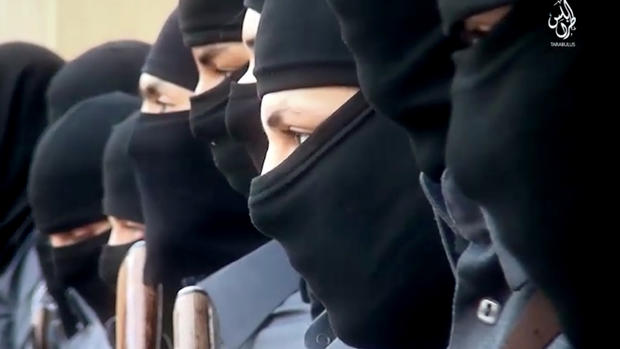Pentagon: U.S. warplanes hit ISIS training camp in Libya
WASHINGTON -- American warplanes struck a training camp for the Islamic State of Iraq and Syria in Libya near the Tunisian border Friday, and a Tunisian described as a key extremist operative was likely killed, U.S. defense officials said. In Libya, local officials estimated that more than 40 people were killed with more wounded, some critically.
A defense official said the strike "likely killed" the target, CBS News national security correspondent David Martin reports. U.S. officials said the strike did not represent the start of a new bombing campaign, Martin reports.
ISIS has made inroads in Libya even as it faces pressure from U.S.-led coalition bombing in Syria and Iraq. The Obama administration has said it would support international military support for counter-ISIS efforts in Libya once the country assembles a unity government, but it also has vowed to strike key targets when opportunities arise.
In a written statement, Pentagon press secretary Peter Cook said the training camp struck Friday was near the Libyan town of Sabratha and targeted extremist Noureddine Chouchane, a Tunisian national. Cook called him "an ISIL senior facilitator in Libya associated with the training camp," using an acronym for the Islamic State of Iraq and the Levant, another name for ISIS.
Two U.S. Air Force F-15E strike aircraft based in Lakenheath, England, carried out the strike, Martin reports. Chouchane was among the approximately 60 fighters in a farmhouse at the time of the attack, and the house was destroyed, Martin reports.
Cook said Tunisian officials in May 2015 had named Chouchane as a suspect in a March 18, 2015, attack on the Bardo Museum in Tunis.
"He facilitated the movement of potential ISIL-affiliated foreign fighters from Tunisia to Libya and onward to other countries," Cook said.
"Destruction of the camp and Chouchane's removal will eliminate an experienced facilitator and is expected to have an immediate impact on ISIL's ability to facilitate its activities in Libya, including recruiting new ISIL members, establishing bases in Libya, and potentially planning external attacks on U.S. interests in the region," Cook added.
ISIS also claimed responsibility for a June 2015 attack at the Tunisian resort of Sousse in which 38 people were reported killed.
Before the Sousse attack, the Tunisian Interior Ministry issued a wanted poster for Chouchane, giving his age - 35 at the time - and full name: Noureddine Ben Tahar Ben Hadj Belgacem Chouchane. He is originally from the Sidi Bouzid region, where the 2011 revolution that ousted President Zine El-Abidine Ben Ali was triggered when a fruit and vegetable seller set himself on fire.
After the Sousse resort attack, the then-security chief for Tunisia, Rafik Chelli, told The Associated Press that the suspects killed in the Bardo and Sousse attacks had received military training in a camp in Sabratha.
On Friday, a witness in Sabratha said he heard two explosions at 3:30 a.m. coming from the nearby village of Qasr Talel, at the same time the Pentagon said the airstrike began. He said the house that was hit belongs to Abdel-Hakim al-Mashawat, known locally as an ISIS militant, he said. He spoke on condition of anonymity because he feared for his safety.
The official Facebook page of the Sabratha local city council also put the death toll at more than 40 with more wounded, some critically. "There are torn body parts buried under the rubble," it said in a posting. It noted that the victims were not all Libyans. The witness said he saw a hospital list that noted victims were from Tunisia and Algeria as well as Libya.
Sabratha is one of the main launching points for smugglers' boats heading to Europe. It has been also a transit point for Tunisians and North African jihadists before joining ISIS affiliates elsewhere in Libya.
The Libyan parliament is close to endorsing a new unity government cabinet, which could eventually seek international military intervention against ISIS extremists who have taken advantage of the country's political vacuum since 2014.
One U.S. official told the AP that Friday's airstrike was taken "with the knowledge of Libyan authorities," but the official would not be more specific about the coordination.
The U.S. military has been closely monitoring ISIS movements in Libya, and small teams of U.S. military personnel have moved in and out of the country. In November, a U.S. military airstrike killed an ISIS leader called Abu Nabil or Wissam al-Zubaydi, an Iraqi national in the eastern city of Darna.
In July, airstrikes targeted an al Qaeda gathering and officials said they targeted Mokhtar Belmokhtar, an al Qaeda-linked militant leader in eastern Libya, but it was a failed operation in the eastern city of Ajdabiya.
British, French and Italian special forces also have been in Libya helping with aerial surveillance, mapping and intelligence gathering in several cities, including Benghazi in the east and Zintan in the west, according to two Libyan military officials who are coordinating with them. The Libyan officials spoke on condition of anonymity recently with The Associated Press on this matter because they were not authorized to speak to the press.
Adding to the concern in Washington and Europe is evidence that the number of ISIS fighters in Libya is increasing - now believed to be about 5,000 - even as the group's numbers in Syria and Iraq are shrinking.
"I have been clear from the outset that we will go after ISIS wherever it appears, the same way that we went after al Qaeda wherever they appeared," Mr. Obama told reporters on Wednesday.
"We will continue to take actions where we've got a clear operation and a clear target in mind," he said. "And we are working with our other coalition partners to make sure that as we see opportunities to prevent ISIS from digging in, in Libya, we take them. At the same time, we're working diligently with the United Nations to try to get a government in place in Libya. And that's been a problem."
